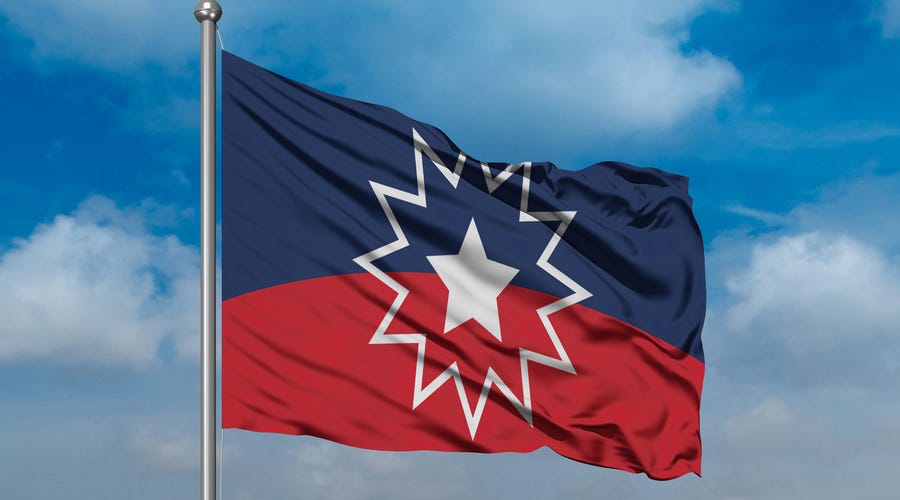In American history, there's a key date often overlooked but profoundly meaningful: Juneteenth.
It's a day that holds both sorrow and joy, marking the end of slavery and the beginning of a new chapter in America.
But Juneteenth isn't just about a somber past — it's a celebration of resilience and unity that continues to resonate today.
This article aims to provide a better understanding of this crucial day, where history meets celebration and reflection. We'll explore the roots of this holiday, from its origins in Texas to its nationwide recognition, and uncover the stories of courage and hope that define it.
While Juneteenth is a history lesson to honor the struggles of the past, it also celebrates that we’ve come a long way.
Whether you’re gathering with friends and family around a barbecue, attending a community festival, learning American English or just exploring the cultural significance of this holiday, there are countless ways to join in.
It’s a good occasion to remember the power of community, the resilience of the human spirit, and the endless possibilities of a future built on justice and equality.
What is Juneteenth
Juneteenth commemorates a pivotal moment in American history: June 19, 1865. Here’s a great TED-ed summary.
On this day, enslaved African Americans in Galveston, Texas, found out about their emancipation — more than two years after President Abraham Lincoln's Emancipation Proclamation and months after the Civil War had ended!
Their long-awaited freedom, delayed by the remoteness of Texas and the resistance of slaveholders, finally arrived with General Gordon Granger's arrival in Galveston to enforce the proclamation. We’ll come back to that.
What does Juneteenth celebrate
Juneteenth celebrates the themes of freedom, resilience, and African American heritage. It’s a painful but necessary reminder of the long and difficult journey toward emancipation and the ongoing struggle for civil rights and equality.
On the Juneteenth holiday, communities across the US gather to honor the sacrifices of their ancestors and to reflect on the enduring legacy of slavery. It’s a day of remembrance, acknowledging the injustices of the past while celebrating the resilience and determination of those who fought for freedom.
This day is also an opportunity to celebrate African American culture, traditions, and contributions to society. From lively parades and festivals to educational events and cultural performances, Juneteenth festivities showcase the vibrancy and richness of African American heritage.
It’s a lot more than just a historical event — it’s a call to action to continue the work of achieving racial equality and justice for all — not only in the US but also in the rest of the world.
Why is it called Juneteenth?
The name "Juneteenth" is a fusion of the words "June" and "nineteenth," which is the date on which the holiday is observed: June 19th.
This colloquial abbreviation became synonymous with the commemoration of freedom and jubilation among African American communities.
The roots of Juneteenth delve into the dark chapters of slavery and the struggle for freedom. It emerged as a celebration of liberation, a symbol of resilience and hope amidst oppression, as well as a testament to the enduring spirit of African Americans.

History of Juneteenth
The journey leading to Juneteenth began with the American Civil War. Lasting from 1861 to 1865, it was fought primarily over issues of states' rights, economic differences, and, crucially, the institution of slavery.
As the war progressed, the question of emancipation became increasingly central.
One of the most pivotal moments came with President Abraham Lincoln's issuance of the Emancipation Proclamation on January 1, 1863.
However, while this proclamation declared freedom for enslaved individuals in Confederate states, it didn’t immediately lead to the end of slavery in the country. Indeed, despite the Emancipation Proclamation, slavery persisted in Southern states like Texas, where the Confederate presence remained strong.
As the Union armies advanced into Confederate territory and the war drew to a close, the Confederate states faced defeat. The surrender of General Robert E. Lee to General Ulysses S. Grant at Appomattox Court House on April 9, 1865, effectively signaled the end of the Civil War.
But, as mentioned, it wasn't until Union General Gordon Granger arrived in Galveston, Texas, on June 19, 1865, that the message of emancipation reached the enslaved population in the state.
Long story short, General Granger's proclamation, known as General Order No. 3, announced the end of slavery and enforced the Emancipation Proclamation in Texas. This declaration sparked scenes of jubilation and celebration among the newly freed African Americans, marking the birth of Juneteenth.
The Thirteenth Amendment to the United States Constitution, which abolished slavery throughout the entire country, was ratified on December 6, 1865, formally ending the institution of slavery in the United States.
Juneteenth holiday observance FAQs
If you’re wondering what the Juneteenth holiday observance in the US entails, keep reading.
We’ll cover which businesses are open or closed, so you can plan ahead.
Are banks closed on Juneteenth?
While some banks and businesses may choose to close in recognition of Juneteenth, it’s not observed as a federal holiday everywhere.
In recent years, several states have taken steps to formally recognize Juneteenth as either a state holiday or a day of observance. These states include Texas, where Juneteenth originated, as well as New York, Virginia, California, and others.
In states where Juneteenth is recognized as a holiday, banks and other institutions might close. However, the extent of closures and official recognition vary from state to state and even within different municipalities.
The federal government is also taking steps to acknowledge Juneteenth. Indeed, in 2021, Juneteenth was officially recognized as a federal holiday through the Juneteenth National Independence Day Act, signed into law by President Joe Biden, along with a powerful speech. As a result, federal employees have the day off, and federal institutions are closed to commemorate the holiday.
It’s relevant to note that Juneteenth became the first new federal holiday since Martin Luther King Jr. Day was adopted in 1983.
What is open and closed on Juneteenth?
What’s closed on Juneteeth?
- Some banks: As mentioned, it varies depending on the institution and location.
- Government offices: Same here, in states where Juneteenth is recognized as a state holiday, government offices at the state and local levels may be closed.
- Schools and universities: Some schools and universities may close in observation of Juneteenth, particularly in states where it is officially recognized as a holiday.
- Post offices: While the United States Postal Service (USPS) does not typically close for Juneteenth, some post offices may have limited hours or closures depending on local policies.
What’s open on Juneteenth?
- Shops: Most shops remain open on Juneteenth, although some may modify their hours or operations.
- Restaurants: Restaurants and eateries are generally open for business on Juneteenth. Some establishments may offer special promotions or events in observance of the holiday.
- Public transport: Public transports such as buses, trains, and subways typically operate on their regular schedules on Juneteenth.
- Private businesses: Many private businesses, including small shops and offices, remain open on Juneteenth unless they choose to close for observance.
Juneteenth colors
Juneteenth is steeped in symbolism and cultural significance. One of the most visually striking elements is its vibrant colors, which symbolize freedom, resilience, and unity. You can refer to the top of the page to see the what the Juneteenth flag looks like.

American flag colors
There’s no American holiday without the Old Glory, and, of course, the colors of the American flag hold deep meaning within the context of Juneteenth. They represent the ideals of liberty, justice, and equality, which are pillars of the American constitution.
Red symbolizes valor and bravery, white signifies purity and innocence, and blue represents vigilance, perseverance, and justice.
On Juneteenth, the American flag serves as a reminder of the progress made in the struggle for civil rights and equality, while also acknowledging the ongoing work that remains to be done.
African flag colors
In addition to the American flag, the colors of the Pan-African flag are also featured in Juneteenth celebrations. They hold deep cultural significance and represent the heritage and resilience of people of African descent.
Red symbolizes the blood shed by ancestors in the fight for freedom and equality. Black represents the people of African descent and their rich cultural heritage. Green symbolizes hope, growth, and the fertile land of Africa.
By combining the colors of both the American and African flags, Juneteenth celebrations pay homage to the dual heritage of African Americans and the interconnectedness of their struggles and victories.
How to celebrate Juneteenth respectfully
One of the many things I love about Americans is their enthusiasm to honor special occasions. Whether it’s attending a community event, celebrating with a barbecue, watching a movie on American history or wearing a special shirt, they surely know how to observe a holiday.
If you want to join the Juneteenth celebrations, here are a few ideas.
Ways to celebrate Juneteenth
Educate yourself with resources
There’s a lot you can do at home, for example reading books from black authors or watching documentaries or movies on slavery.
Schools, libraries, museums, and other cultural institutions often organize educational programs and exhibits to raise awareness about the significance of Juneteenth and its historical context.
Incorporate Juneteenth colors
You can wear clothes that feature the colors of Juneteenth, or wear a special shirt.
If you’re hosting a gathering, you can incorporate these colors in the table decoration, and even in the dishes and drinks.
Join a community event
Many communities — especially in states with significant African American populations or strong historical ties to Juneteenth — host events and activities to celebrate Juneteenth.
They may organize parades, concerts, barbecues, and historical reenactments.
How to celebrate Juneteenth at work
Send your employees an email with information about the holiday
Inclusivity at work starts with awareness. You can inform your team & colleagues about the significance of Juneteenth, its history, and why it's celebrated.
Emails, newsletters, and posters are great. You can also offer reading lists and documentaries focused on Black history, culture, and anti-racism to encourage ongoing learning and understanding among employees.
Organize a company-wide discussion or presentation
Even better, you can host a virtual or in-person discussion about the importance of Juneteenth, its historical context, and its relevance today.
Invite guest speakers or encourage employees to share personal stories and reflections.
Incorporate Juneteenth colors
Adorn your workplace with decorations featuring the traditional Juneteenth colors, as mentioned.
You can also wear a special shirt, and encourage your colleagues to do the same — corporate dress code allowing, of course.
Support Black-owned businesses
Encourage your staff and colleagues to shop at Black-owned businesses for catering, gifts, or services for any Juneteenth-related events or activities.
Volunteer or contribute to relevant causes
You can organize volunteer opportunities or fundraising initiatives to support organizations working towards racial justice, equality, and empowerment within the Black community.
Offer a day off or flexible scheduling
Consider giving employees the option to take the day off to observe Juneteenth, or providing flexibility in scheduling to allow for participation in local celebrations or events.
Foster open dialogue
Although this should be a priority at any time, Juneteenth is a great occasion to make sure your company offers a safe space for discussions on racial equality and inclusion.
Encourage employees to share their experiences, perspectives, and ideas for creating a more inclusive workplace year-round.
Juneteenth is a poignant reminder of the struggles of the past but also a celebration of the resilience, strength, and triumph of the human spirit.
It’s an inspiration to strive towards a future where equality and freedom are not just ideals but lived realities for all.
Juneteenth is not merely a date on the calendar; it is a symbol of hope, progress, and justice.
So, let’s commemorate Juneteenth with a common dream: A nation — and world — where people “will not be judged by the color of their skin but by the content of their character.”
And if you’re interested in American culture and English learning, keep an eye on our blog!



